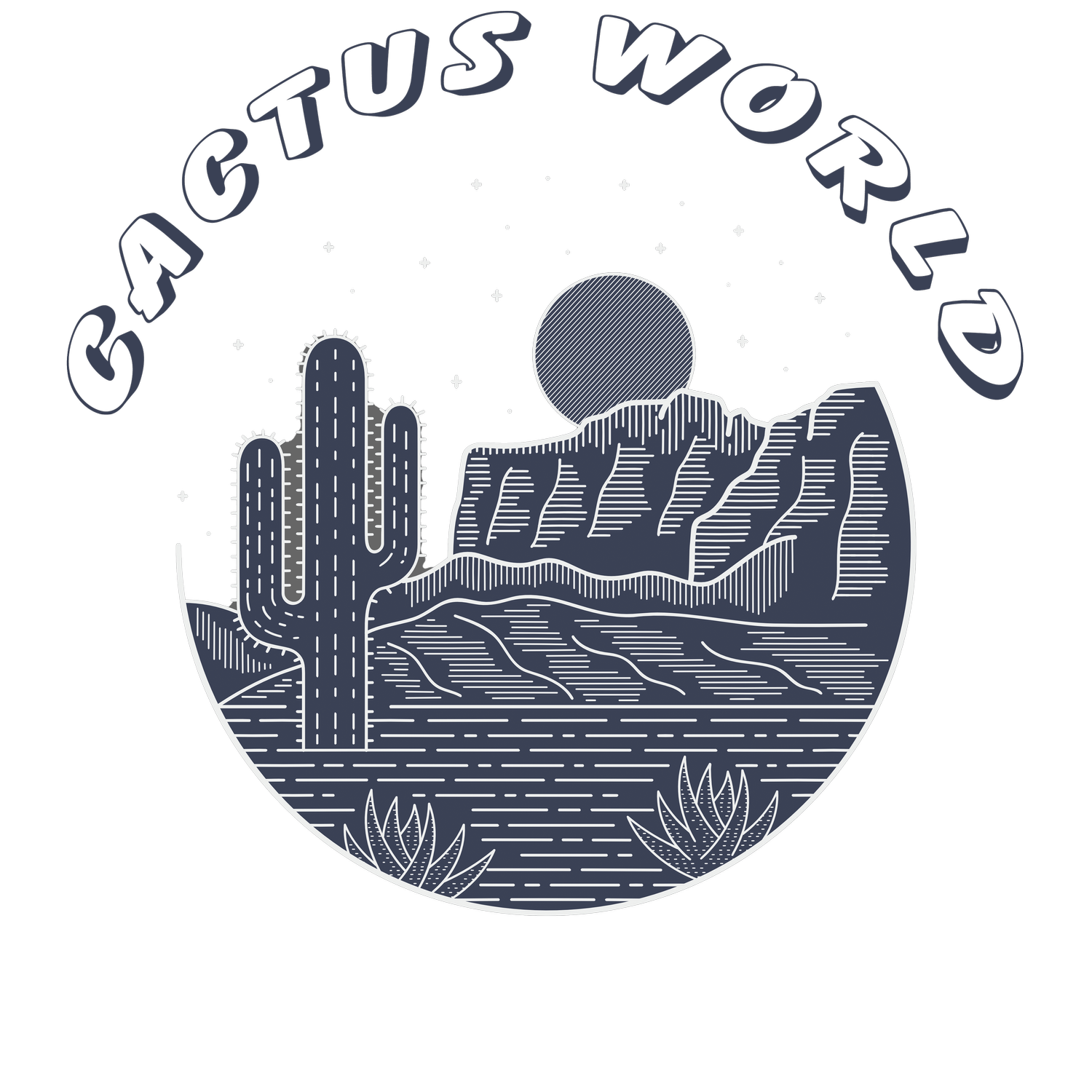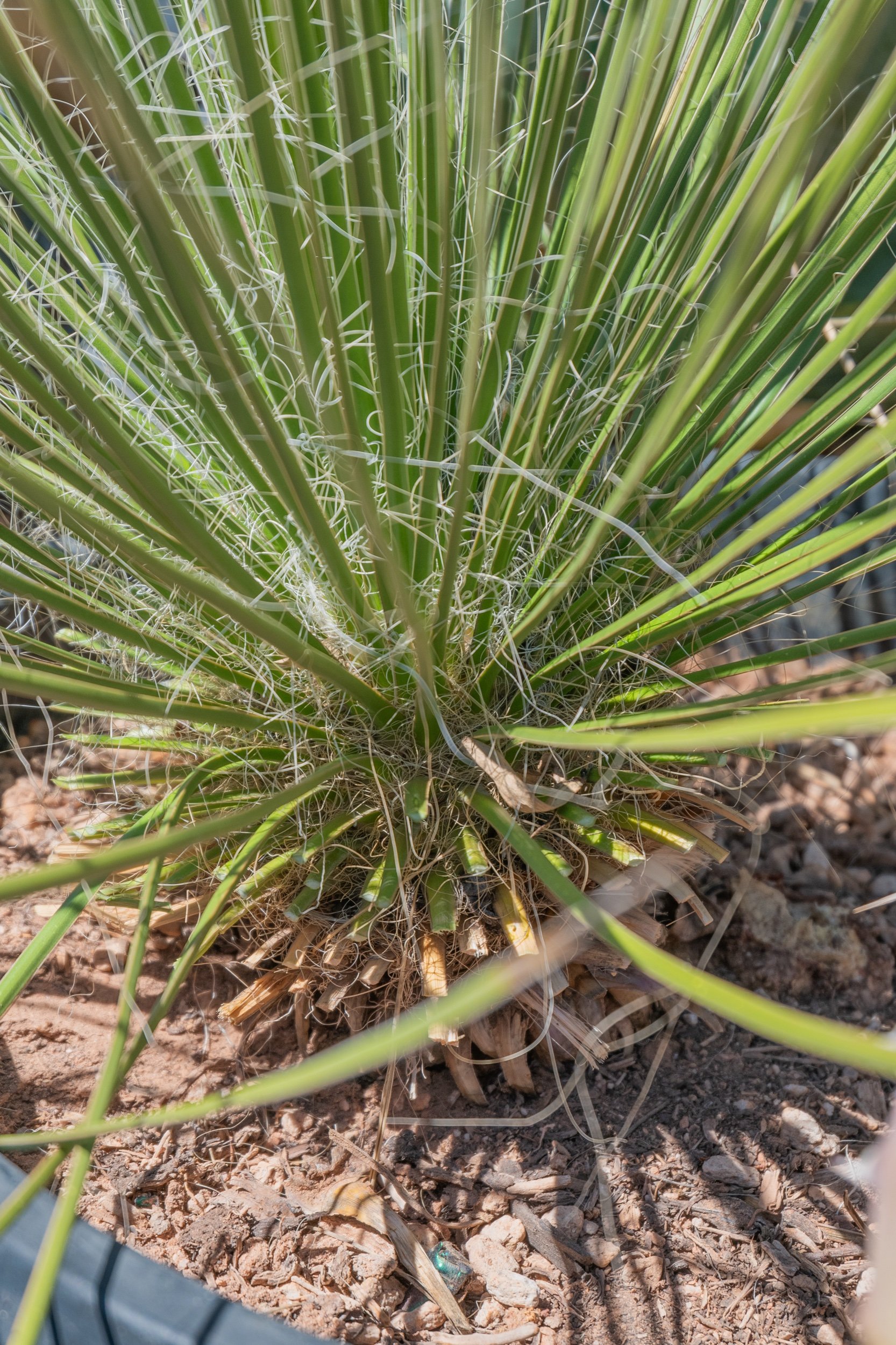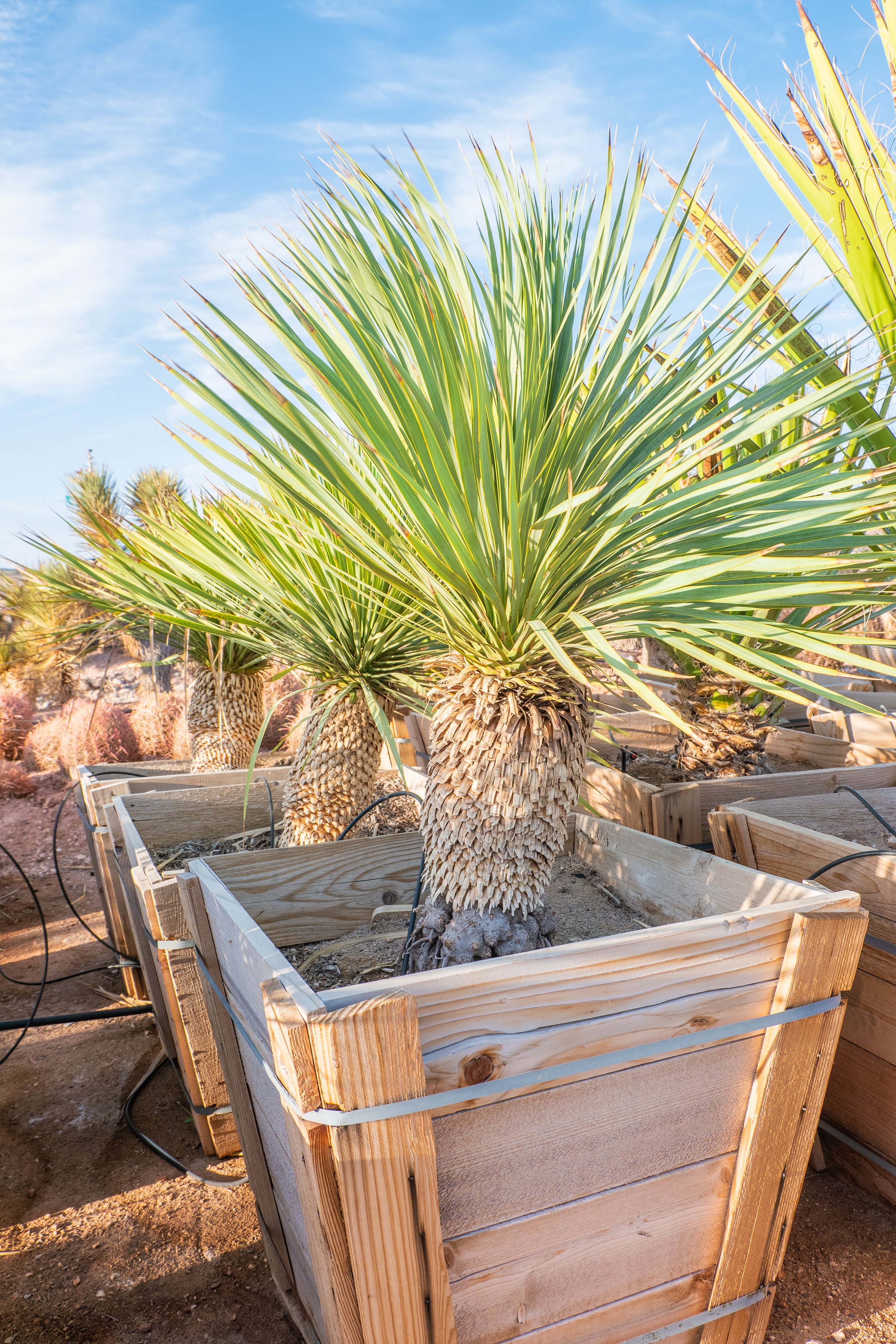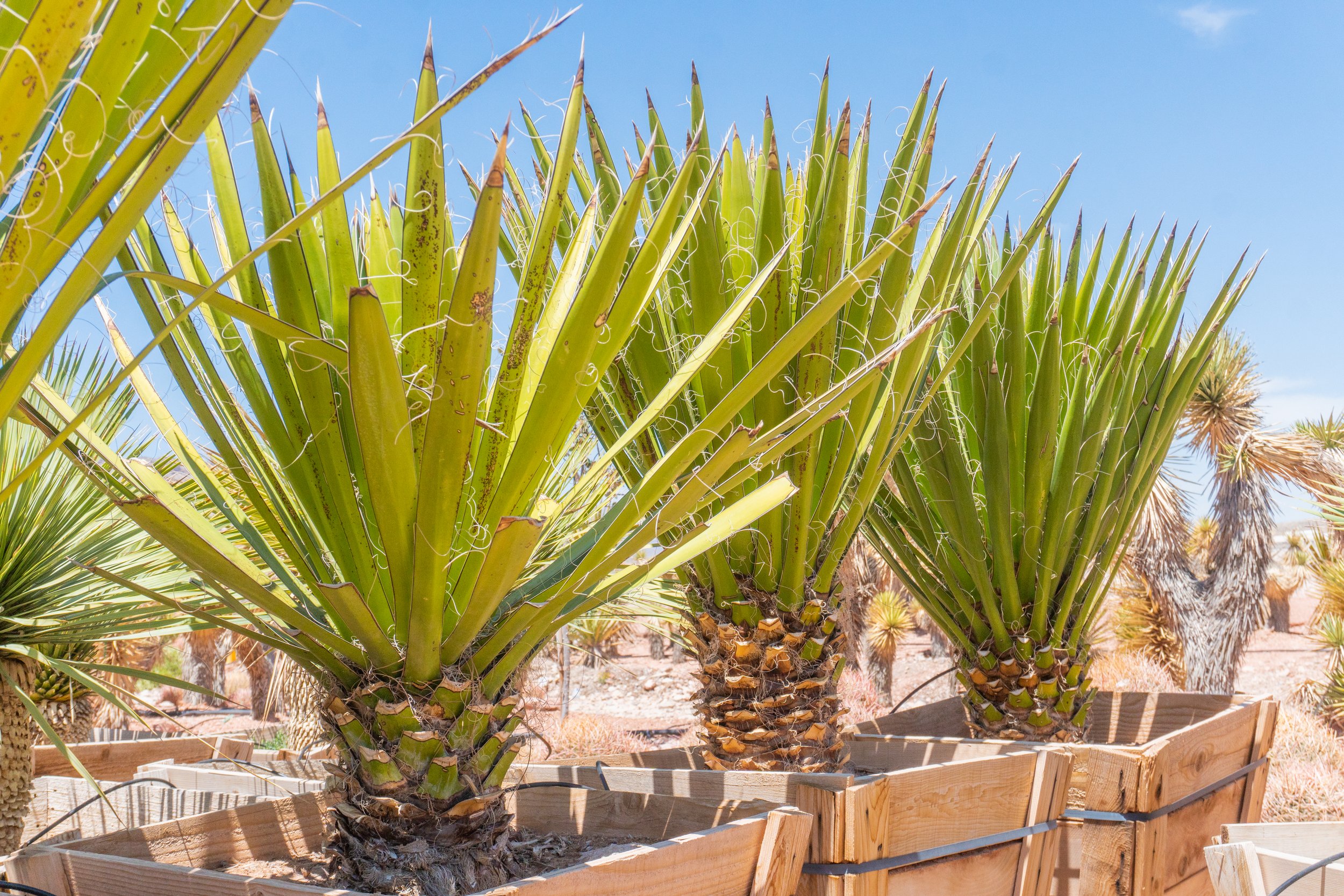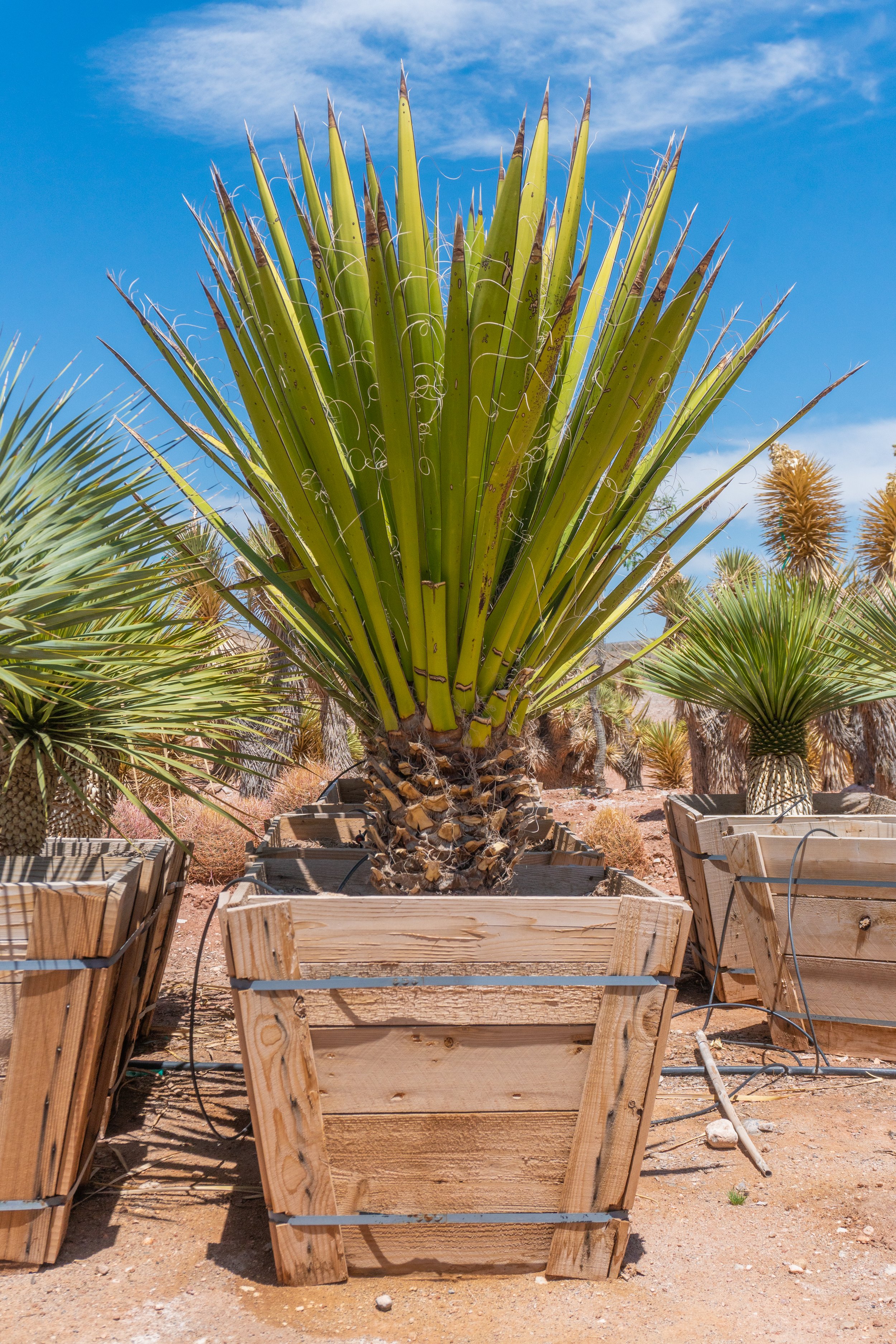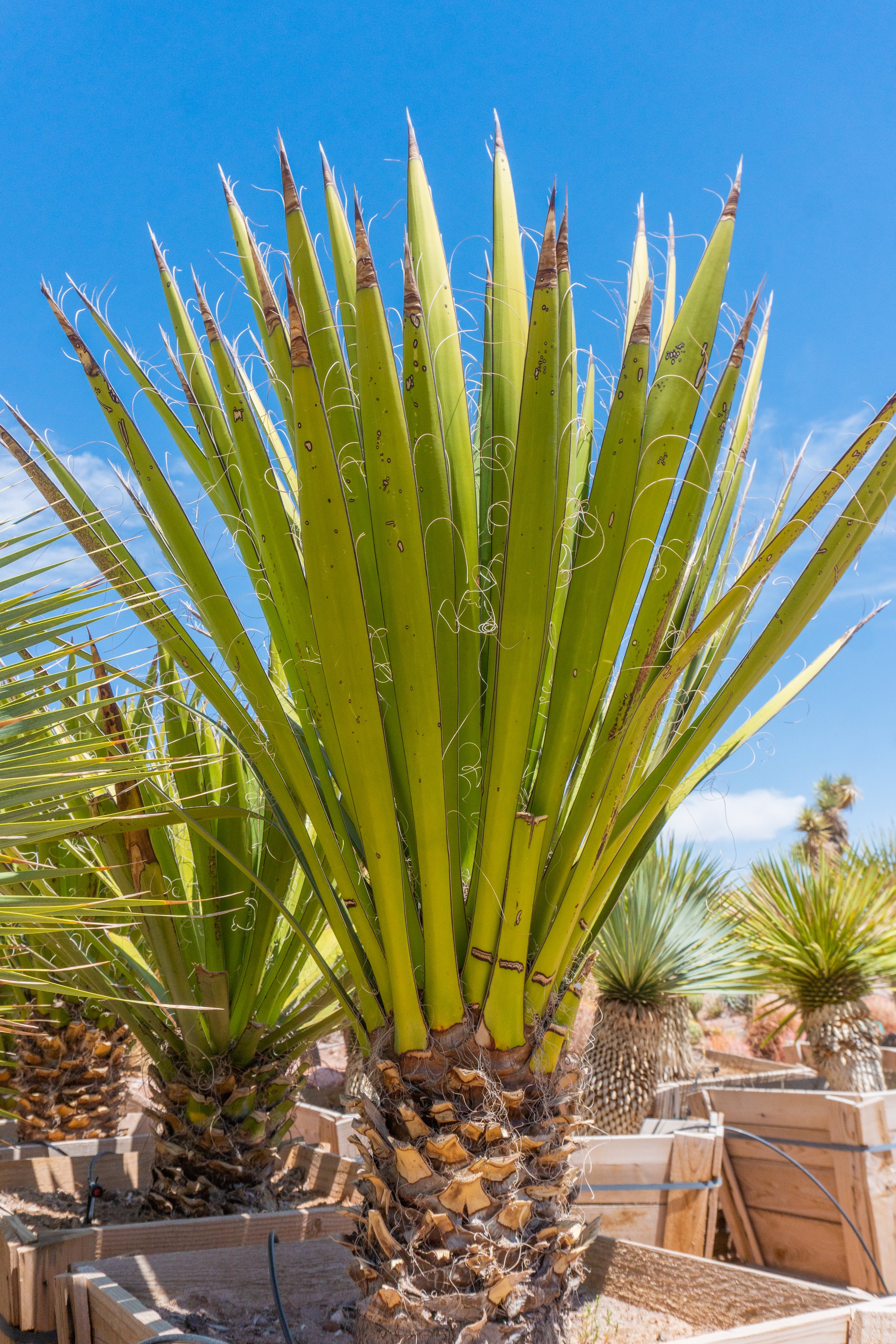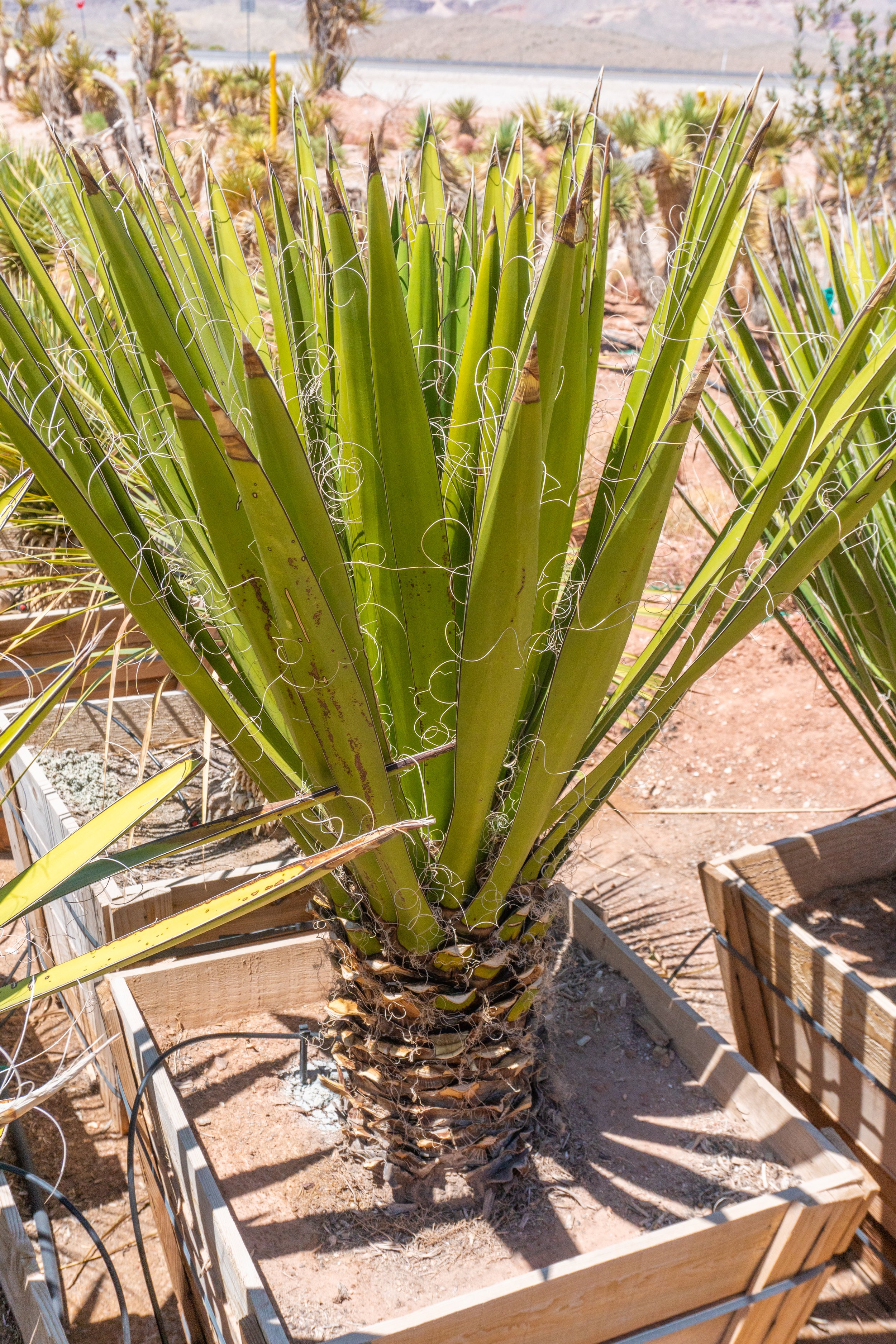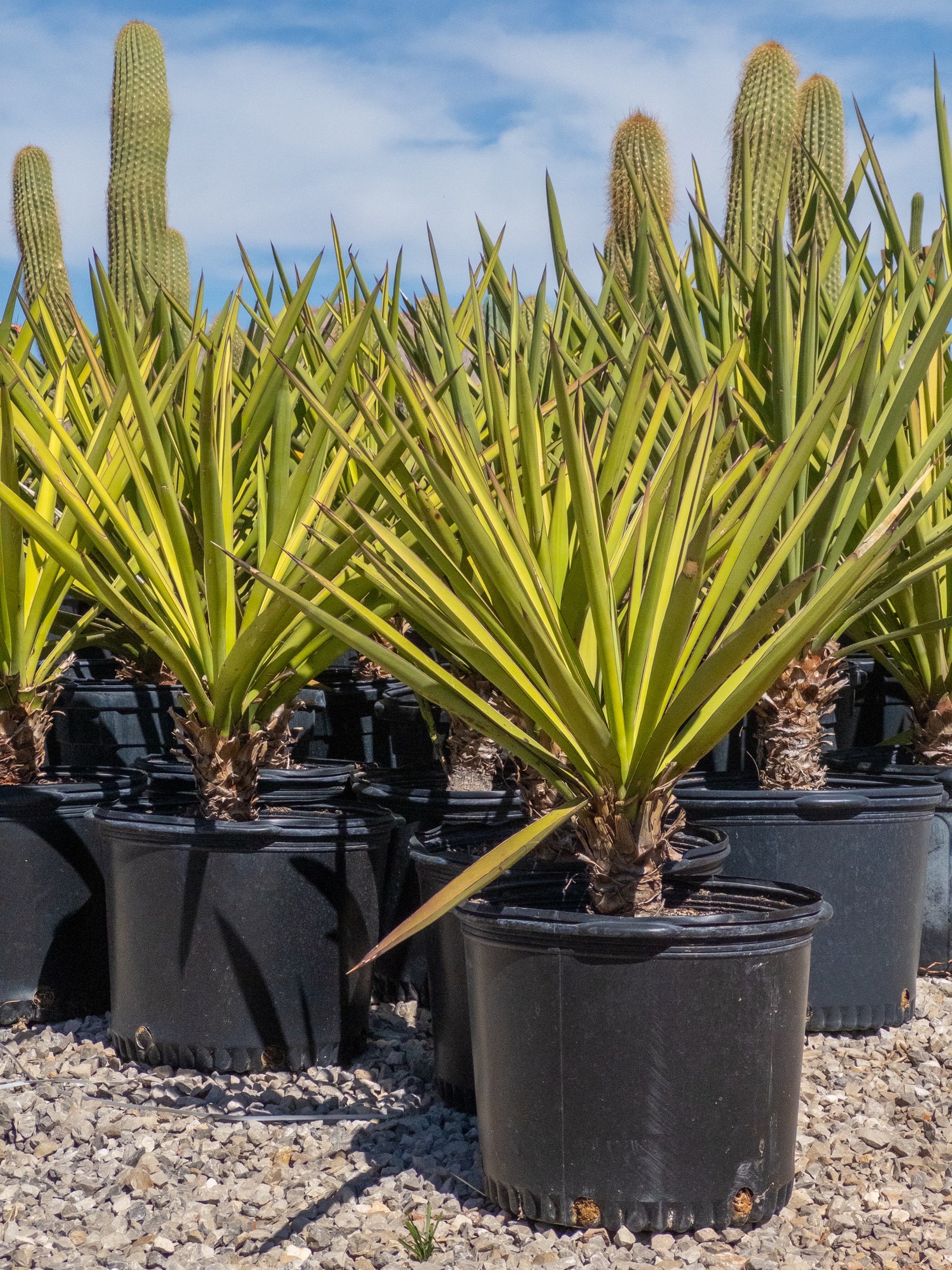Yucca Elata (soaptree yucca)
This is a yucca with fine, arching, gray-green to blue-green leaves with white margins. Plants resemble coarse bunchgrass when young, gradually developing several heads on trunk-like stems with age. Evergreen, palmlike shrub or small tree with single trunk or several clustered trunks; unbranched or with few upright branches and very long, narrow leaves. The local name "Palmilla," Spanish for "small palm," refers to the resemblance of this species to a palm.
Flowering: stem in 3-7 ft. long with 25-30 side branches covered with clusters of creamy-white, bell-shaped flowers.
Yucca elata, also known as the soaptree yucca, is a truly remarkable plant that has captured the hearts and imaginations of people for centuries. With its striking beauty and remarkable hardiness, it has played a significant role in the cultural and ecological landscape of the southwestern United States and northern Mexico.
The soaptree yucca is a breathtaking plant that can grow up to 25 feet tall, though it is typically found at heights of 10-15 feet. Its slender, fibrous leaves can reach lengths of up to 2 feet and are arranged in a symmetrical rosette pattern. In the spring and summer, the yucca produces tall, elegant spikes of white or cream-colored flowers that can be up to 4 feet in length. The flowers are fragrant and attract pollinators like bees and moths. After blooming, the plant produces large, dry seed pods that can persist on the plant for years.
For thousands of years, the soaptree yucca has been a staple of the region's indigenous cultures. The plant's roots contain a natural soap-like substance that was used for washing clothes, hair, and skin. The tough, fibrous leaves were used to make baskets, clothing, and other woven goods. The plant was also an important food source, as the flower buds and fruits were consumed by humans and wildlife alike. Today, the soaptree yucca remains an important symbol of the region's cultural and ecological heritage.
The soaptree yucca is a hardy and adaptable plant that can grow in a variety of conditions. It prefers well-drained soil and full sun, but can also tolerate partial shade. The plant is drought-tolerant and can survive long periods without water, making it ideal for arid and semi-arid climates. It is also resistant to most pests and diseases, making it a low-maintenance addition to any garden or landscape. However, it is important to note that the plant is not frost-tolerant and may require protection during the winter months in colder climates.
In summary, Yucca elata is a magnificent and versatile plant that is as beautiful as it is functional. With its striking appearance, rich cultural history, and adaptability, it is an excellent choice for anyone looking to add a touch of the southwestern United States to their garden or landscape.
Sun: Full
Water: Low
Soil: Sandy
*PHOTOS ARE EXAMPLES OF PLANT, THE ONE YOU WILL RECEIVE WILL DIFFER SLIGHTLY
SHIPPED BARE ROOT / PLEASE CHECK LOCAL SHIPPING RESTRICTIONS
This is a yucca with fine, arching, gray-green to blue-green leaves with white margins. Plants resemble coarse bunchgrass when young, gradually developing several heads on trunk-like stems with age. Evergreen, palmlike shrub or small tree with single trunk or several clustered trunks; unbranched or with few upright branches and very long, narrow leaves. The local name "Palmilla," Spanish for "small palm," refers to the resemblance of this species to a palm.
Flowering: stem in 3-7 ft. long with 25-30 side branches covered with clusters of creamy-white, bell-shaped flowers.
Yucca elata, also known as the soaptree yucca, is a truly remarkable plant that has captured the hearts and imaginations of people for centuries. With its striking beauty and remarkable hardiness, it has played a significant role in the cultural and ecological landscape of the southwestern United States and northern Mexico.
The soaptree yucca is a breathtaking plant that can grow up to 25 feet tall, though it is typically found at heights of 10-15 feet. Its slender, fibrous leaves can reach lengths of up to 2 feet and are arranged in a symmetrical rosette pattern. In the spring and summer, the yucca produces tall, elegant spikes of white or cream-colored flowers that can be up to 4 feet in length. The flowers are fragrant and attract pollinators like bees and moths. After blooming, the plant produces large, dry seed pods that can persist on the plant for years.
For thousands of years, the soaptree yucca has been a staple of the region's indigenous cultures. The plant's roots contain a natural soap-like substance that was used for washing clothes, hair, and skin. The tough, fibrous leaves were used to make baskets, clothing, and other woven goods. The plant was also an important food source, as the flower buds and fruits were consumed by humans and wildlife alike. Today, the soaptree yucca remains an important symbol of the region's cultural and ecological heritage.
The soaptree yucca is a hardy and adaptable plant that can grow in a variety of conditions. It prefers well-drained soil and full sun, but can also tolerate partial shade. The plant is drought-tolerant and can survive long periods without water, making it ideal for arid and semi-arid climates. It is also resistant to most pests and diseases, making it a low-maintenance addition to any garden or landscape. However, it is important to note that the plant is not frost-tolerant and may require protection during the winter months in colder climates.
In summary, Yucca elata is a magnificent and versatile plant that is as beautiful as it is functional. With its striking appearance, rich cultural history, and adaptability, it is an excellent choice for anyone looking to add a touch of the southwestern United States to their garden or landscape.
Sun: Full
Water: Low
Soil: Sandy
*PHOTOS ARE EXAMPLES OF PLANT, THE ONE YOU WILL RECEIVE WILL DIFFER SLIGHTLY
SHIPPED BARE ROOT / PLEASE CHECK LOCAL SHIPPING RESTRICTIONS
This is a yucca with fine, arching, gray-green to blue-green leaves with white margins. Plants resemble coarse bunchgrass when young, gradually developing several heads on trunk-like stems with age. Evergreen, palmlike shrub or small tree with single trunk or several clustered trunks; unbranched or with few upright branches and very long, narrow leaves. The local name "Palmilla," Spanish for "small palm," refers to the resemblance of this species to a palm.
Flowering: stem in 3-7 ft. long with 25-30 side branches covered with clusters of creamy-white, bell-shaped flowers.
Yucca elata, also known as the soaptree yucca, is a truly remarkable plant that has captured the hearts and imaginations of people for centuries. With its striking beauty and remarkable hardiness, it has played a significant role in the cultural and ecological landscape of the southwestern United States and northern Mexico.
The soaptree yucca is a breathtaking plant that can grow up to 25 feet tall, though it is typically found at heights of 10-15 feet. Its slender, fibrous leaves can reach lengths of up to 2 feet and are arranged in a symmetrical rosette pattern. In the spring and summer, the yucca produces tall, elegant spikes of white or cream-colored flowers that can be up to 4 feet in length. The flowers are fragrant and attract pollinators like bees and moths. After blooming, the plant produces large, dry seed pods that can persist on the plant for years.
For thousands of years, the soaptree yucca has been a staple of the region's indigenous cultures. The plant's roots contain a natural soap-like substance that was used for washing clothes, hair, and skin. The tough, fibrous leaves were used to make baskets, clothing, and other woven goods. The plant was also an important food source, as the flower buds and fruits were consumed by humans and wildlife alike. Today, the soaptree yucca remains an important symbol of the region's cultural and ecological heritage.
The soaptree yucca is a hardy and adaptable plant that can grow in a variety of conditions. It prefers well-drained soil and full sun, but can also tolerate partial shade. The plant is drought-tolerant and can survive long periods without water, making it ideal for arid and semi-arid climates. It is also resistant to most pests and diseases, making it a low-maintenance addition to any garden or landscape. However, it is important to note that the plant is not frost-tolerant and may require protection during the winter months in colder climates.
In summary, Yucca elata is a magnificent and versatile plant that is as beautiful as it is functional. With its striking appearance, rich cultural history, and adaptability, it is an excellent choice for anyone looking to add a touch of the southwestern United States to their garden or landscape.
Sun: Full
Water: Low
Soil: Sandy
*PHOTOS ARE EXAMPLES OF PLANT, THE ONE YOU WILL RECEIVE WILL DIFFER SLIGHTLY
SHIPPED BARE ROOT / PLEASE CHECK LOCAL SHIPPING RESTRICTIONS
